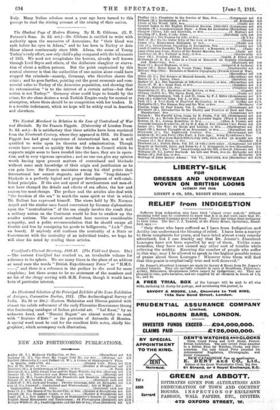The Neutral Merchant in Relation to the Law of Contraband
of War and Blockade. By Sir Francis Piggott,. (University of London Press. 2s. 6d. net.)—It is satisfactory that these articles have been reprinted from the Nineteenth Century, where they appeared in 1915. Sir Francis Piggott has had great experience of international law, and is well qualified to write upon its theories and administration. Though events have moved so quickly that the Orders in Council which he supports might seem to have receded into the haze, they are in opera- tion, and in very vigorous operation ; and no one can give any opinion worth laving upon present matters of contraband and blockade without some such knowledge of their origin and justification as he can gain here. Sir Francis maintains among his chief points that international law cannot stagnate, and that the "long-distance" blockade is a perfectly logical and proper development of well-estab- lished principles. If the size and speed of merchantmen and men-of- war have changed the details and effects of sea affairs, the law and custom too must change. The preface and the articles also deal with "the freedom of the sea" in much the same spirit as that in which Mr. Balfour has expressed himself. The views held by Mr. Norman Angell and the similar ones found convenient by German diplomatists upon the " neutralization " of the sea simply involve the result that a military nation on the Continent would be free to swallow up the smaller nations. The neutral merchant here receives considerable sympathy, and a polite recommendation that he should escape all trouble and loss by consigning his goods to belligerents, " f.o.b " (free on board). If anybody still confuses the neutrality of a State or Government with the neutrality of an individual trader, we hope he will clear his mind by reading these articles.


































 Previous page
Previous page